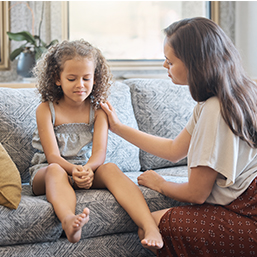
I recently heard Dr. Laura Markham say, “parents set the weather in their home.”
It stopped me in my tracks.
She went on to acknowledge that kids certainly bring their fair share of storms. Of course they do! At their stages of development and learning, that’s their job.
As adults, we have the skills to determine whether we react to these storms or respond thoughtfully. We control the weather.
Despite all the inconsistencies of life, we determine how we show up for our families. We choose the food, we set the rules, we create expectations for sleep, we look after ourselves. The skills we develop to manage ourselves determine whether or not we can:
So how do we improve the family forecast?
We look after ourselves first. We regularly eat sustaining food. We set clear expectations and consequences. We
live the values we want our kids to learn. We create the habits that allow us to get enough sleep (seven to nine hours/night). We move our bodies often. We have fun and connect with friends and with ourselves.
Doing this allows us to create a peaceful family weather forecast. Our ability to respond with a clear head and heart will result in:
What to say when storms arise?
Before the storm: “Your body is showing me that things don’t feel right. How can we get that feeling out safely? Will you run around the backyard or shall we dance it out? Do you want to go read a book or color for a few minutes or would you like me to hold you and you can tell me what’s up?”
Kids’ temper tantrum: “Wow! You are really sad/angry/concerned about that. I’m right here. Let’s find a way to make this work more smoothly.”
Parents’ temper tantrum: Use mindfulness. Think: “I just used a really loud voice and felt out of control. I’m going to take some breaths and find a way to help everyone feel less attacked.”
Siblings fighting: “Looks like things are not working very well here. We can make this work. Let’s get safe and find a way to solve this problem. I know we can do it.”
When everyone is out of control: Stronger voice: “We all need to stop!” Quieter voice: “Things feel really big! Let’s move apart for 10 minutes, get big feelings out safely and then come back together to work this out. I’ll set the timer.”
Connecting with friends and family is important. Connecting with ourselves may be even more critical to better understand the situations that are throwing us off. Each week, I offer a free Parent-Break: 30 minutes to get quiet, focus on a specific parenting tip and talk it out with parents who are going through the same things. Join at parent-break.com or facebook.com/groups/parentbreak.
You have the power to change the weather.
Author, blogger, podcast host and parenting expert, Julie has been supporting parents across North America for 20 years. Through her company JFS Parent Education, she helps parents find relief from their everyday parenting challenges. Want to know how she can help you? Email her today: This email address is being protected from spambots. You need JavaScript enabled to view it..
See our related articles:
Calgary’s Child Magazine © 2024 Calgary’s Child